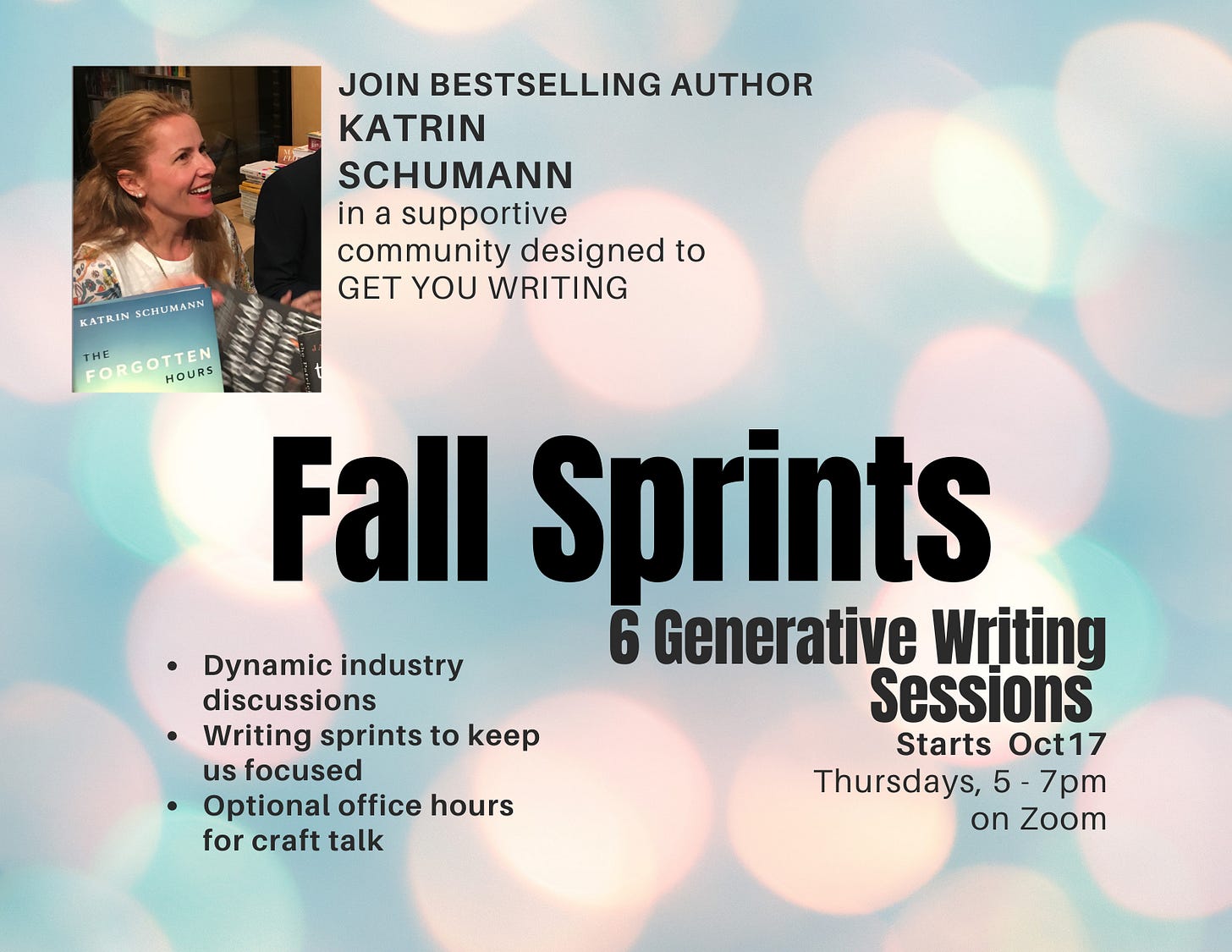This is a section of the newsletter The Curious Kat. Follow along as I write novel #4. Opting out of these updates (and sticking with the newsletter) is easy: go to the footer of this post, select "Unsubscribe" (next to “Anatomy of a Novel”) and click "Turn off emails."
If you join me here, you’ll be taking a weekly deep dive in the psychology of drafting long form fiction. Who knows, the process may surprise you. What comes easily and what is hard? What kinds of choices am I making and why?
If you enjoy the post, please click on the heart or comment in the app!
It all started out so well
Last week in New York I walked and ran from Central Park South all the way up to 103rd Street, and then made my way to Riverside Drive and back.
I was thinking about writing a scene that takes place in NYC in the late 1920s and I wanted to take a look at Takamine’s townhouse. I’d already read a book about these storied houses, but I wanted to see the place with my own eyes.
Why does this make a difference? Who knows.
As I headed north through Central Park, I felt my energy begin to build. I started having ideas about my characters and plot. The heaviness I sometimes feel when faced with a daunting creative undertaking was turning into excitement.
My new novel is inspired by Jokichi Takamine, a wildly successful Japanese scientist. In the late 1800s he married a girl from New Orleans and went on to discover adrenaline and broker the gift of cherry trees to Washington DC.
At the turn of the century, Takamine had a house in the Catskills - my novel centers on the experience of a young German immigrant, Bea Pfennig, who becomes deeply involved with Takamine, his family, and the incredible Japanese villa he resurrected in the woods. I spent my summers just down the road from this amazing place, which eventually fell into disrepair because no one could figure out what the hell to do with it.
Once I got to Riverside Drive, this is the tableaux that most intrigued me (see picture below): the door and the front stoop. Something about the fancy ironwork contrasting with the grubby stairs. Once upon a time, Takamine and his wife and two young sons climbed those steps, up and down, up and down.
It’s fascinating to me the way things change and the way they stay the same.

And then I was hit with a curveball that changes everything
A year ago, I didn’t have an agent. For a mid career writer, that’s a scary thing. I wrote about having to break up with my agent here; let me tell you that experience was 2+ years of living hell.
Well now I’m on the other side and it’s a huge relief. The day after I ran to Riverside Drive to see Takamine’s city home, I met with my new agent in person for the first time. We had lunch in an Italian restaurant in FiDi. This is what I dreamed of in those early years - being a professional author, ‘wined and dined’ by a champion of my work. Pretty sweeeeeeet.


Toward the end of lunch, we were talking about how I’d like to share my new pages with her and what the process of developing the next book might look like.
Usually I don’t like to show anyone a draft until I have something pretty decent in hand. As I write, my characters and plots intensify and become much more nuanced and interesting. It takes me a while to find my way and even once I have a good sense of where I’m headed, I need to layer in details to add complexity and depth. Since my work is still only half baked at that point, I feel like it’s just not ready for critiquing.
But after writing three novels (and re-writing each of them significantly), I want to be sure I’m heading in the right direction before I get in too deep. I’ve been working on this new idea for about a year; I’ve done a lot of research, travelled to Japan, and written about 30k words.
My agent and I talked about how my drafting process might go if she were to become more involved. All seemed to be going well.
But as I started talking more about the plot and gaining steam, she started to look concerned.
Watch out!
It turns out that choosing to write about a European woman who becomes involved with a Japanese family is potentially controversial. Why? Because I’m not Japanese.
I think my jaw might have dropped to the floor, I was so surprised.
It’s not as if I haven’t thought about this a lot. In this post I mention Gabriel Tallent writing from the POV of a 14-year old abuse victim and I’ve written previously about the Jeannine Cummins American Dirt fiasco (here are a variety of takes on that drama).
Also, I’ve experienced a version of this already. When I began writing Madame B. - which takes place in 1965 - my protagonist Nanette was popping pills and behaving erratically. I imagined her as an undiagnosed depressive, perhaps even bi-polar; this disease wasn’t mentioned by name nor was she herself aware of any kind of diagnosis. In talking with my then-agent about the book (after I had a solid first draft), I described Nanette as behaving “kind of manic” in one scene.
“Wait, hold on,” she said. “Are you manic depressive?”
I ended up cutting out the pills and stopped even thinking my character might be suffering from any undiagnosed conditions. I am, in fact, not manic depressive (though my uncle was, so I’m familiar with the disease) but it wasn’t really a big deal in terms of my story or themes to temper that part of the story.
But this? This is telling me that including ANY stories that go beyond my own personal expertise, background or culture is basically a no-go.
Right or wrong, editors are spooked.
… so now what?
Sally Rooney’s new novel has two male protagonists. In this recent NYT article, she says, “I’ve never been conscious, in writing about any emotional experience that any of my characters have had, of drawing on something that I have felt or known in my own life” (italics mine).
Pause.
Wow.
Rooney has been ‘accused’ by critics and readers of lifting too much from her own life. And yet she says she doesn’t even draw on her own past emotional experiences. Ha ha! Man, you can’t win at this game.
What is the publishing industry up to? Inhibiting creative people from using their imaginations can’t be good for the growth and productivity of this business.
I won’t lie, I was gutted after that conversation. But as time passes, I’m less panicked. Because this is what writers do: they regroup.
I know lots of writers who’ve had to ditch ideas and research or re-write entire novels. In the moment it feels absolutely tragic, and then the pain lessens and you start thinking about how to move forward.
The big questions I’m facing now are: do I want to write this novel as I first conceived of it, or do I want to rethink the entire story?
But…
… how can I rethink the story so it still explores class and culture pre- and post- Depression - themes I’m deeply invested in? That part is much harder to give up than a few plot elements.
What do you think about writers only writing about what we ourselves have experienced?
Fall Sprints are filling fast
Thank god for teaching, and working for KWLS, as I decide what direction I’m going to take with this novel.
I’m so pleased that the sprints class is filling, and I encourage you to think about joining us. Here is what a student from the Summer Sprints said about the experience:
“The class kept me focused on my writing, even with all the other things happening in my personal and professional life. Setting a goal and discussing it with the group created an internal accountability that I appreciated. I set a goal of finishing the draft by the end of the sprints, and I did that, which is something of a surprise to me. I also liked the sense of camaraderie that emerged in the group. I enjoy Katrin’s perspective and her description of her own writing process—something I don’t think is typically discussed in classes that focus on craft.”
We start in three weeks. Plenty of time for you to get yourself organized, and make working on your project a priority. More information here or feel free to email me.






As you know, I am deeply invested in this. I know that Rebecca Makkai really sweated writing The Great Believers about gay men during the AIDS Epidemic, but thank goodness she did. It is a beautiful, moving story. She obviously could not have had any first hand experience, but the care with which she wrote the story was indicative of the immense research she undertook. You have done the same! I know you will take this and turn it into something incredible.
That limitation is crazy - and stifles creativity. Do you have to have experience as a space fighter to write Star Wars?